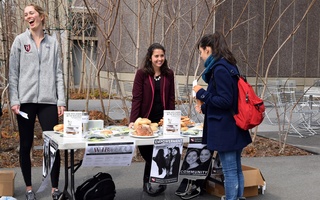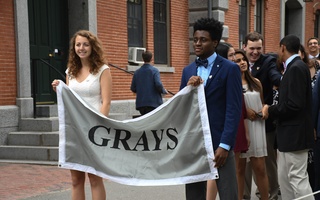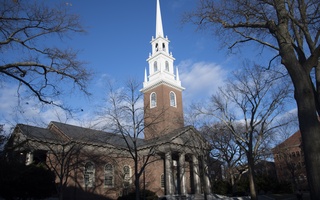{shortcode-f4bc780190d897018299ccca2ad7bbd10d196349}
A group of students met to discuss how the contentious confirmation of Supreme Court Justice Brett Kavanaugh affected student life and mental health at Harvard on Monday night in the basement of Grays Hall.
The discussion, entitled “Being in and of the World: Do Societal Changes Affect Social Life at Harvard?” was the second in a Diversity Dialogue Series sponsored by the Office of Diversity Education & Support. The first event was a discussion about the affirmative action lawsuit against the University.
Diversity Peer Educators, who serve as student ambassadors to the Office of Diversity Education & Support, directed the conversation.
“Primarily, we just wanted to create a space,” Diversity Peer Educator Michelle Liang ’19 said. “The Kavanaugh case was really pressing and creating a lot of emotions that were just floating around and, at least for me, not necessarily having an outlet. As the DPEs, we just wanted to create a space where we could turn this energy into something productive.”
At least two women stepped forward in the weeks prior to Kavanaugh's confirmation to accuse the judge of sexual assault perpetrated decades ago. Undergraduate and graduate students protested Kavanaugh's nomination following the accusations, and called on Harvard Law School to bar him from returning in the winter to teach as a lecturer. Days before his confirmation, Law School administrators announced that Kavanuagh would not be teaching his scheduled winter course.
Hannah A. Lemmons ’20, a Diversity Peer Educator, said that the event allowed students to speak what was on their minds.
“The primary goal is to provide students a space to talk about issues that they might not necessarily get a chance to discuss in their daily lives,” Lemmons said. “Whether that means you don’t get a chance to talk about this with your friends [or] … an academic context, you can come to these dialogues and get some of those thoughts off your chest.”
While other campus support resources exist for students who have experienced sexual assault on campus, such as the Office for Sexual Assault Prevention & Response and the Title IX office, the peer educators said that they had a specific responsibility to create a separate event to process the Kavanaugh confirmation.
“OSAPR focuses on resources, providing resources to survivors. We’re more about creating a space for students, especially for talking and processing together,” Liang said. “We’re different from counselors in that respect too, because it’s more about opening up dialogues between students.”
Liang also said that the event specifically fell within the realm of the Office of Diversity Education & Support.
“What’s going on in the Kavanaugh case in the White House is the result of a lack of diversity and lack of diverse perspectives and diversity in background, race, gender. I guess where DPEs come into this is recognizing the harm that lack of diversity can cause and also the affirmative action case was really about that too, making sure that diversity continues to be a part of this campus," she said.
Some students attending the event said it was important to have a space on campus where they could discuss societal issues.
“The reason I really like these dialogues is because they allow me to self-reflect and bounce ideas off of other people, and by doing that, to refine my own ideas,” Sydney A. Lewis ’22 said. “It’s unlikely that I’ll come in feeling a certain way and leave with a completely new understanding, but I don’t think that’s the goal. I think the goal is more introspection and self-reflection and coming to term with your own views and also respecting the views of others.”
“[The discussion] was cathartic for me,” she added.
The next talk in the Diversity Dialogue series, “Culture or Costume?”, will be held on Oct. 29 and will discuss cultural appropriation in time for Halloween.
Read more in College News
Two Months into the Semester, New Lev Deans Settling into RoleRecommended Articles
-
Toward a Better City HallWe believe that Walsh’s goal is a noble and important one: An office of diversity has real potential to reduce problems with race relations in Boston.
-
 WIB Week Begins With Focus on Outreach and Diversity
WIB Week Begins With Focus on Outreach and Diversity -
 Harvard Today: April 7, 2015
Harvard Today: April 7, 2015 -
 Diversity Peer Educators Expand On-Campus Presence
Diversity Peer Educators Expand On-Campus Presence -
 Student Group Launches Peer Educator Program for Spirituality
Student Group Launches Peer Educator Program for Spirituality













